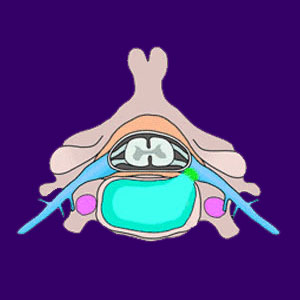
Herniated disc symptoms can be drastically different in every individual patient. These symptoms range from severe to non-existent. If the disc is not putting pressure on the spinal cord or a nerve, there may be no symptoms at all. In fact, many people have herniated discs and never even know it. The vast majority of herniations are asymptomatic and cause no pain or problems whatsoever.
Spinal discs have no internal nerve endings. Therefore, they feel no pain. The only way a disc can cause pain is by affecting a neurological structure by compressing it or irritating it in some way. Luckily most herniations do neither and simply exist without causing pain. This is not to say that many of these discs are not mistakenly blamed for enacting symptoms, since statistically they are. Misdiagnosis of disc pathologies is one of the most widespread types of iatrogenesis in the dorsalgia sector.
This essay examines the potential symptomatic expressions of intervertebral prolapse, as well as the likelihood that any given herniated disc will remain completely asymptomatic.
Lumbar Herniated Disc Symptoms
The following are symptoms which may be mistakenly blamed on lower back herniations or actually be caused by pathological bulges in rare instances:
Pain in the lower back, buttocks and radiating down into the legs might be expressed in some patients. Pain can result due to general spinal trauma after injury or may be elicited through partial compression of nerve tissue. Pain may also be the result of lumbar central spinal stenosis.
Numbness, tingling or weakness in the lower back, buttocks or legs can be caused by true compression of a spinal nerve root in the low back.
Loss of reflexes in one or more areas of the legs is a good indicator of neurological involvement due to a herniation or other causative process. Foot drop may occur in extreme cases.
Symptoms felt in the lower extremities may affect one or both legs. The symptoms might only affect part of the leg, ankle or foot. The affected location might change from day to day or remain the same. These symptoms are commonly called sciatica.
Cauda Equina Warning
If there is loss of bladder or bowel control or numbness in the genitals, seek professional assistance immediately. This might be the signs of a very serious health crisis called cauda equina syndrome. Cauda equina syndrome is certainly the very worst of the possible herniated disc symptoms and must be treated as a medical emergency.
Cervical Herniated Disc Symptoms
The following are symptoms which may be mistakenly blamed on herniations in the neck or might actually be caused by pathological disc issues in somewhat rare circumstances:
Pain in the upper back, neck, chest, shoulders, arms or hands can be caused by herniations which impinge on neurological tissues or enact central spinal stenosis. In cases of severe stenosis, symptoms may also be felt in the lower body and may mimic other pseudosciatica expressions.
Numbness, weakness or tingling in the arms or hands is a possible indicator of a compressive neuropathy condition in the cervical spine.
Symptoms felt in the arms or hands may affect one or both sides. The symptoms might only affect part of the arm, wrist or hand. The affected location might change from day to day or remain the same. This condition is commonly called a pinched nerve.
Herniated Disc Symptom Misconceptions
Most doctors believe that some disc herniations have the ability to cause pain and I agree. Although most herniated discs are not inherently negative health issues, some can be. However, none should be implicated as sources of symptoms without definitive evidence of a causative process.
Unfortunately, many doctors and other care providers propagate the myth that all herniations are inherently painful. This is nonsense and goes completely against accepted medical fact. Usually these doctors are counting on their misinformation to convince patients that profitable treatment is necessary. It is all about the almighty dollar in these cases.
Herniations have been deemed to have no direct connection to the incidence of chronic pain. There are too many examples of people living with one or more disc herniations and never even knowing that they exist. These bulging or ruptured discs are often discovered by accident, when testing for a completely unrelated condition.
It is also a proven scientific fact that continued compression of a nerve will cause the nerve to stop transmitting completely. The result of this would be objective numbness, not pain. Therefore, the idea that a herniated disc might be causing pain for months, years or even decades, is ridiculous.
I am living proof. If you saw my back imaged on an MRI, you would say: “Oh my God, poor guy!” The images are scary. One of my lumbar discs is bulging towards the spinal cord and slightly to one side. The other has ruptured directly into the spinal nerves, yet I am 100% pain-free. Now I have a total of 12 herniations in my spine. However, I do absolutely nothing at all to treat them. I find that this approach is also the best form of treatment I have ever undertaken! A non-treatment approach, if you will…
Learn the truth about herniated disc symptoms before ever seeking any drastic care, such as spinal surgery. Once you cross that bridge, there is no coming back.





